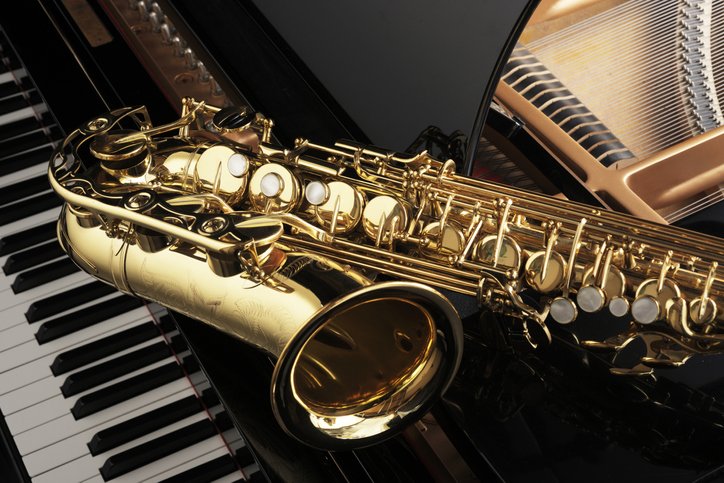Music to Your Ears: Choosing the Perfect Music for a Funeral
My grandfather, Pappy, was a huge lover of jazz. In his younger years, he played the sax in a jazz band that was immensely popular throughout the Chicago area. He even met Dizzy Gillespie and Louis Armstrong, two of his favorite jazz musicians, on several occasions.
Pappy also had an enormous vinyl collection and inspired all of us grandkids to share his fondness for this expressive style of music. When Pappy passed away last year, it was only fitting that jazz music was a central theme at his funeral. At the repast, we adorned the church hall with pictures of Pappy and the jazz greats, and we played his beloved records for hours. It was a wonderful celebration of our grandfather’s legacy and we could feel him smiling down on us.

The music that’s included in a funeral or memorial service can make the experience particularly meaningful.
When it’s time to say goodbye to a loved one, the funeral process provides comfort to the bereaved while honoring the life of the deceased. Incorporating musical elements into this important ritual can strike a chord in a way that nothing else can. Whether it’s performed by a soloist, an ensemble or via a recording, music helps to set the tone for a deeply personal and memorable service.
Music can play a number of roles during the funeral service and reception.
It’s a powerful tool that connects us with our deepest emotions and can convey feelings that words alone simply cannot express. The structure provided by certain songs, such as familiar hymns, can be comforting during times of grief. The lyrics and melody of a song can even communicate a message of love, hope, faith or even humor to those in attendance. Music also has a way of connecting us to memories. Hearing songs that were favorites of the deceased can transport people back to specific moments in time and evoke fond recollections.
A wide variety of music can have its place in a funeral or memorial service.
Songs that represent religious traditions, popular music, and special instrumentals can all be appropriate. Some common examples include:
- Favorites of the deceased: Selecting music that was meaningful to the departed is a highly personalized way to honor his or her legacy. No matter what style or genre of music your loved one preferred, there are suitable, tasteful ways to incorporate it into the funeral proceedings.
- Religious songs: Traditional musical selections from a particular faith can be comforting and moving for many people. Your clergy person will likely have suggestions about songs to incorporate into the service. Formal guidelines about which musical selections are appropriate and which are not may also exist.
- Cultural music: Music is closely tied to important rituals in all human cultures and has been incorporated into memorials for thousands of years. From the Australians who used music as a way to communicate with the deceased, to the elaborate elegies of the ancient Celts, there is a long and varied history of musical usage in funeral rites. In the African American culture, the use of gospel and spiritual music is a popular and long-standing funeral tradition.
Because music is so evocative, its usage during the funeral should come with some special considerations:
- Think carefully about how it may make mourners feel. From the song choices to the order in which they are played, music can have a deep impact on the grief-stricken. For example, songs of sorrow may be best early in the service, songs of remembrance in the middle, and songs with a message of hope towards the end.
- Don’t rule out more lighthearted selections. Uplifting songs can change the entire mood of a memorial service. Often the decision to incorporate this type of non-traditional song into a service is dictated by the personality of the deceased and the circumstances of his or her death. The goal should be to make choices that are poignant without being distasteful.
- Live music can be particularly powerful. To include live music performed by family, friends, or other people who were meaningful to the deceased can be very potent. Live performances should be arranged in advance so that you can discuss what songs would be most appropriate. Those who are performing should also talk with the person leading the service in order to make sure the program flows smoothly.
- Think outside of the box. Music can be incorporated into other aspects of the funeral process beyond the service itself. Live or recorded music playing in the background during visitation can help to create a sacred setting. At the repast, musical choices tend to be less formal. This can be a great time to integrate popular tunes that reflect the preferences of the deceased.
- Keep in mind that there are no ‘right’ or ‘wrong’ songs for your loved one’s funeral. The music you select depends on the person you’re remembering, the mood you want to set, and the traditions you want to honor.
Do you need further assistance in choosing the music for a loved one’s funeral? Our knowledgeable, compassionate team of funeral professionals are here to help. Please reach out to us anytime.
About Vaughn Greene Funeral Services: For more than 20 years, Vaughn Greene Funeral Services has been providing a ministry of care to Baltimore’s African American community. As a leading local, minority- and family-owned provider, we promise to provide our highest level of service and respect to families who entrust us to honor their loved one. For more information, please call us at 410.655.0015 or visit us online at https://vaughncgreene.com/.







Comments